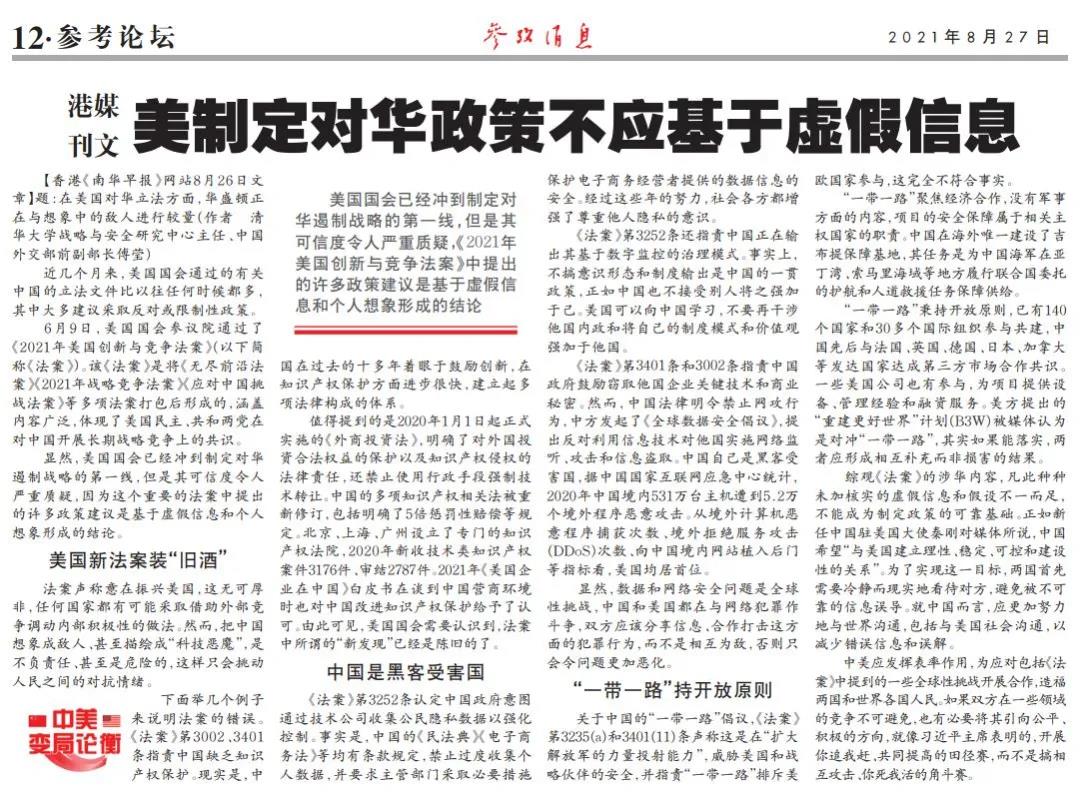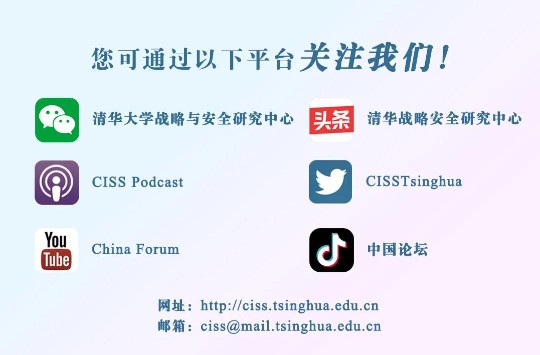编者按
8月26日,香港《南华早报》网站发表清华大学战略与安全研究中心主任傅莹题为“美国对华政策制定基于虚假信息是危险和不负责任的”的文章。8月27日,参考消息进行摘编刊发。以下为中英文全文:

近几个月来,美国国会通过的有关中国的立法文件比以往任何时候都多,其中大多建议采取反对或限制性政策。
6月9日,美国国会参议院通过了《2021年美国创新与竞争法案》(以下简称《法案》)。该《法案》是将《无尽前沿法案》《2021年战略竞争法案》《应对中国挑战法案》等多项法案打包后形成的,涵盖内容广泛,体现了美国民主、共和两党在对中国开展长期战略竞争上的共识。
显然,美国国会已经冲到制定对华遏制战略的第一线,但是其可信度令人严重质疑,因为这个重要的法案中提出的许多政策建议是基于虚假信息和个人想象形成的结论。
美国新法案装“旧酒”
法案声称意在振兴美国,这无可厚非,任何国家都有可能采取借助外部竞争调动内部积极性的做法。然而,把中国想象成敌人、甚至描绘成“科技恶魔”,是不负责任、甚至是危险的,这样只会挑动人民之间的对抗情绪。
下面举几个例子来说明法案的错误。《法案》第3002、3401条指责中国缺乏知识产权保护。现实是,中国在过去的十多年着眼于鼓励创新,在知识产权保护方面进步很快,建立起多项法律构成的体系。
值得提到的是2020年1月1日起正式实施的《外商投资法》,明确了对外国投资合法权益的保护以及知识产权侵权的法律责任,还禁止使用行政手段强制技术转让。中国的多项知识产权相关法被重新修订,包括明确了5倍惩罚性赔偿等规定。北京、上海、广州设立了专门的知识产权法院。2021年《美国企业在中国》白皮书在谈到中国营商环境时也对中国改进知识产权保护给予了认可。由此可见,美国国会需要认识到,法案中所谓的“新发现”已经是陈旧的了。
中国是黑客受害国
《法案》第3252条认定中国政府意图通过技术公司收集公民隐私数据以强化控制。事实是,中国的《民法典》《电子商务法》等均有条款规定,禁止过度收集个人数据,并要求主管部门采取必要措施保护电子商务经营者提供的数据信息的安全。经过这些年的努力,社会各方都增强了尊重他人隐私的意识。
《法案》第3252条还指责中国正在输出其基于数字监控的治理模式。事实上,不搞意识形态和制度输出是中国的一贯政策,正如中国也不接受别人将之强加于己。美国可以向中国学习,不要再干涉他国内政和将自己的制度模式和价值观强加于他国。
《法案》第3401条和3002条指责中国政府“鼓励窃取”他国企业关键技术和商业秘密。然而,中国法律明令禁止网攻行为,中方发起了《全球数据安全倡议》,提出反对利用信息技术对他国实施网络监听、攻击和信息盗取。中国自己是黑客受害国,据中国国家互联网应急中心统计,2020年中国境内531万台主机遭到5.2万个境外程序恶意攻击。从境外计算机恶意程序捕获次数、境外拒绝服务攻击(DDoS)次数、向中国境内网站植入后门等指标看,美国均居首位。
显然,数据和网络安全问题是全球性挑战,中国和美国都在与网络犯罪作斗争,双方应该分享信息、合作打击这方面的犯罪行为,而不是相互为敌,否则只会令问题更加恶化。
“一带一路”持开放原则
关于中国的“一带一路”倡议,《法案》第3235(a)和3401(11)条声称这是在“扩大解放军的力量投射能力”,威胁美国和战略伙伴的安全,并指责“一带一路”排斥美欧国家参与,这完全不符合事实。
“一带一路”聚焦经济合作,没有军事方面的内容,项目的安全保障属于相关主权国家的职责。中国在海外唯一建设了吉布提保障基地,其任务是为中国海军在亚丁湾、索马里海域等地方履行联合国委托的护航和人道救援任务保障供给。
“一带一路”秉持开放原则,已有140个国家和30多个国际组织参与共建,中国先后与法国、英国、德国、日本、加拿大等发达国家达成第三方市场合作共识。一些美国公司也有参与,为项目提供设备、管理经验和融资服务。美方提出的“重建更好世界”计划(B3W)被媒体认为是对冲“一带一路”,其实如果能落实,两者应形成相互补充而非损害的结果。
综观《法案》的涉华内容,凡此种种未加核实的虚假信息和假设不一而足,不能成为制定政策的可靠基础。正如新任中国驻美国大使秦刚对媒体所说,中国希望“与美国建立理性、稳定、可控和建设性的关系”。为了实现这一目标,两国首先需要冷静而现实地看待对方,避免被不可靠的信息误导。就中国而言,应更加努力地与世界沟通,包括与美国社会沟通,以减少错误信息和误解。
中美应发挥表率作用,为应对包括《法案》中提到的一些全球性挑战开展合作,造福两国和世界各国人民。如果双方在一些领域的竞争不可避免,也有必要将其引向公平、积极的方向,就像习近平主席表明的,开展你追我赶、共同提高的田径赛,而不是搞相互攻击、你死我活的角斗赛。
Fu Ying: In US legislation targeting China, Washington is wrestling with a shadow enemy
More legislative documents concerning China have passed through Capitol Hill offices in recent months than ever before, mostly suggesting countering or restrictive policies on China and the Chinese people.
On June 9, the US Senate passed the Innovation and Competition Act of 2021. A combination of several China-related bills – including the Endless Frontier Act, the Strategic Competition Act of 2021, and the Meeting the China Challenge Act of 2021 – the Innovation and Competition Act covers a wide swathe of issues and demonstrates a bipartisan consensus for the US to engage in long-term strategic competition with China.
Capitol Hill is now on the front line of formulating US containment strategy against China. But its credibility is in serious doubt, as its policy suggestions in the act are drawn from conclusions based on misinformation and personal imagination.
There is nothing wrong with the act’s purpose, which is to stimulate American rejuvenation, as any country may choose to motivate itself through external competition. However, it’s irresponsible or even dangerous to make China an imaginary enemy, even a science and technology bogeyman, which will only rouse antagonism between the two peoples.
Here are some of the flaws in the act. Sections 3002 and 3401 claim that China lacks intellectual property (IP) protection. Yet China has made rapid improvement over the past decade in IP protection for the sake of innovation.
One notable legislative move, among many, is the Foreign Investment Law of 2020 that safeguards the legitimate rights and interests of foreign investment against IP infringement. The law also prohibits using administrative means to force the transfer of technology.
Further, several IP-related laws are being amended, with punitive compensation for wrongdoing raised fivefold. Major cities including Beijing, Shanghai and Guangzhou have established special IP courts and, in 2020, there were 3,176 technology-related IP cases reported, with 2,787 of them concluded.
The American Chamber of Commerce in China, in the 2021 edition of its white paper on China’s business environment, also acknowledged China’s improvement on IP protection. Capitol Hill needs to be reminded that its so-called new findings are outdated.
Section 3252 holds that the Chinese government intends to strengthen its control by collecting citizens’ private data via technology companies. This claim cannot be supported by reality in China, either.
China’s civil code and e-commerce law both prohibit the over-collection of individual data and require the relevant authorities to take the necessary measures to protect the security of the data and information provided by e-commerce businesses.
Section 3252 further claims that China is exporting a governance model based on a data monitoring system. On the political front, it has been China’s consistent policy not to impose its ideology and political system on other countries, just as it would not accept having one imposed on it. The US can learn from China and stop interfering in other countries’ internal affairs and imposing its own model and values.
Sections 3002 and 3401 of the act accuse the Chinese government of encouraging and empowering the theft of critical technologies and trade secrets from foreign enterprises. However, cyberattacks are prohibited in China.
China launched the Global Initiative on Data Security last September calling on nations to oppose surveillance, cyberattacks and information theft against other countries. China itself has been a victim of hacking attacks.
According to the National Computer Network Emergency Response Technical Team/Coordination Centre of China, a total of 5.31 million attacks against Chinese hosts from 52,000 foreign programs was recorded in the first half of 2020. As indicated, among the foreign malware capture, the number of foreign distributed denial of service (DDoS) attacks, and back doors implanted into Chinese websites, the US was actually the most common source.
Data and internet security is a global challenge and both China and the US are fighting cybercrime. The two countries should exchange information and work together to crack down on these crimes instead of making enemies of each other, which will only exacerbate the problem.
On China’s Belt and Road Initiative, Sections 3235 (a) and 3401 (11) of the act claim it “expands the power projection capabilities for the People’s Liberation Army” and threatens the security of the US and its strategic partners. They also claim the initiative excludes US and European participation.
This view counters the reality. The belt and road features infrastructure projects with no military component whatsoever. For every infrastructure project, security matters are the responsibility of the sovereign states concerned.
China has only one foreign military base, in Djibouti, the role of which is to supply the Chinese navy on UN missions in the Gulf of Aden and Somalia waters.
The belt and road incorporates some 140 countries and over 30 international organisations. Some US companies have also joined to provide equipment, management experience and financial services. Though the US-led Build Back Better World initiative is seen as a rival to the Belt and Road Initiative by some media, if set in motion, the two could complement rather than undermine each other.
Generally, the act is riddled with unreliable and unverified information regarding China which cannot serve as a sound policy foundation. As the new Chinese ambassador to the US Qin Gang told the press, China hopes for a “rational, stable, manageable and constructive” relationship with the US.
To achieve such an objective, the two countries first need to take a cool-headed and realistic measure of each other and avoid being misguided by unreliable stories and information. On China’s part, it should make a greater effort to communicate with the world, including with American society, to reduce misunderstanding.
It’s also important that China and the US act as examples and cooperate to address global challenges, including those mentioned in the act, to benefit the people of both countries and the world.
If we are to compete, it is necessary to steer the competition in a fair and positive direction. As noted by China’s President Xi Jinping, US-China competition should be more like a race on the track and less like a fight in the wrestling arena.
Fu Ying is the chair of the Centre for International Security and Strategy (CISS) at Tsinghua University and former vice-foreign minister of China.
英文原文首发于2021年8月26日南华早报

